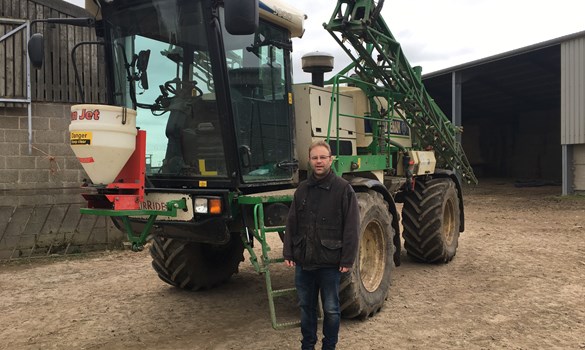Monitor Farm meeting: Brigg
Environment issues – A sign of things to come
Read the report from last month's meeting on soils, compaction and headland management.
Programme
- Registration/refreshments
- Welcome and introduction: Judith Stafford – AHDB Cereals & Oilseeds Knowledge Exchange Manager, North
- Brigg Monitor Farm update: Colin Chappell – AHDB Cereals & Oilseeds Monitor Farmer
- Autumn drilling
- How the crops are looking
- Soil health
- Any changes since last meeting
- Scene setting – Environmental issues at Brigg Monitor Farm: Colin Chappell
- Building a resilient business in the face of uncertainty
- Dealing with loss of actives
- Stewardship at Brigg Monitor Farm
- Stewardship and headland management
- Benefits
- Financial aspects – the figures
- Where cover crops fit in
- Integrated Pest Management: Steve Ellis (ADAS)
- What is IPM, how does it fit in with crop production and why is it important?
- Update on latest developments and existing/new research projects including control of:
- Cabbage stem flea beetle
- BYDV
- Stewardship and Environmental Land Management: Barney Parker, Consultant, Ashfield Farmed Environment Services
- Experiences with countryside stewardship; the good & the bad
- How will environmental schemes gradually replace the direct support system in place now?
- Environmental Land Management development; where are we now?
- Questions & Answers; discussion on environment management
- Summary of main points and take home messages
- Opportunity for any further questions
- Lunch and meeting close
About Brigg Monitor Farm
Colin Chappell farms with his family at Gander Farm near Brigg, Lincolnshire. The lowland mixed arable and beef unit has 615 ha combinable crops and 32 ha permanent pasture. Colin’s arable rotation is normally peas or oilseed rape, followed by two wheats. He recently replaced his second wheats either with spring wheat due to black-grass pressure, or maize on lighter land for a local AD plant. During the three years of the programme Colin hopes to look at succession, joint venture farming and how his farm can survive in a post-EU Britain.
Find out more by visiting the Brigg Monitor Farm page.
About Monitor Farms
AHDB Monitor Farms bring together groups of like-minded farmers who wish to improve their businesses by sharing performance information and best practice around a nationwide network of host farms. AHDB organises and facilitates Monitor Farm meetings for farmers, who own and operate the scheme – by farmers, for farmers. Monitor Farms are part of the AHDB Farm Excellence Programme. Each Monitor Farm project runs for three years.


